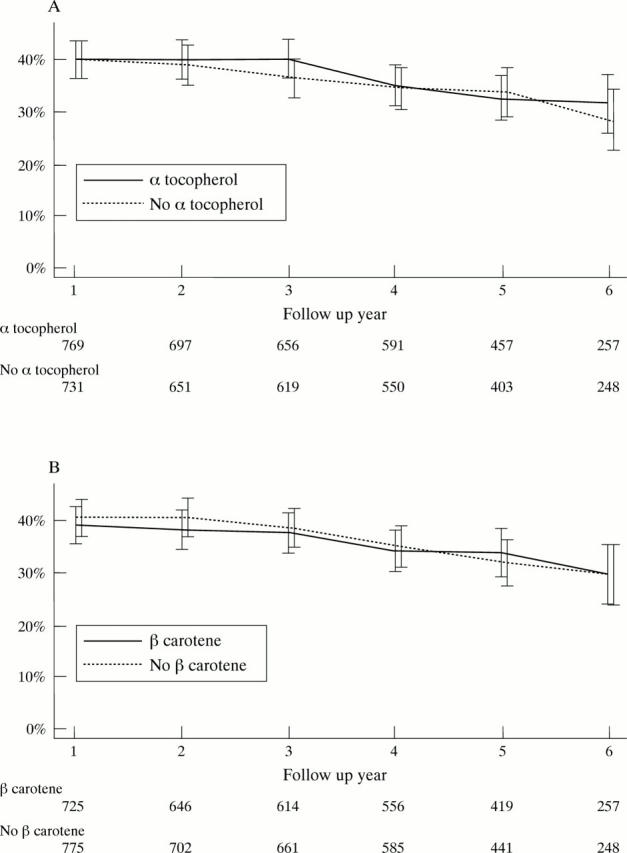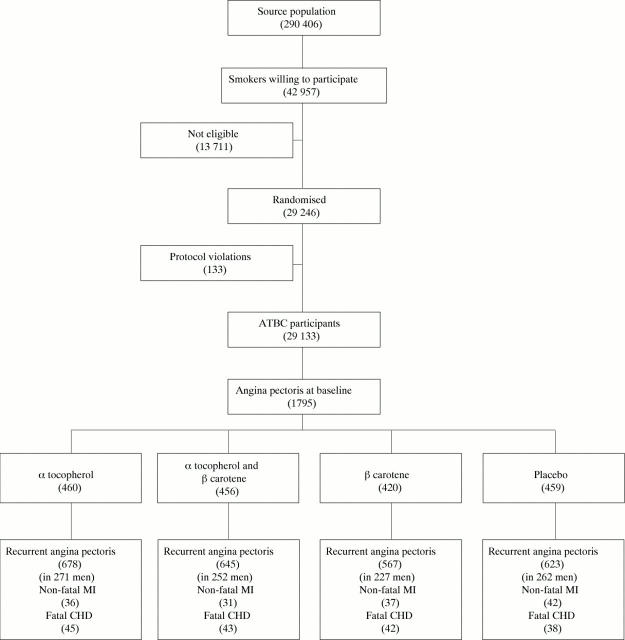Abstract
Objective—To evaluate the effects of α tocopherol and β carotene supplements on recurrence and progression of angina symptoms, and incidence of major coronary events in men with angina pectoris. Design—Placebo controlled clinical trial. Setting—The Finnish α tocopherol β carotene cancer prevention study primarily undertaken to examine the effects of α tocopherol and β carotene on cancer. Subjects—Male smokers aged 50-69 years who had angina pectoris in the Rose chest pain questionnaire at baseline (n = 1795). Interventions—α tocopherol (vitamin E) 50 mg/day, β carotene 20 mg/day or both, or placebo in 2 × 2 factorial design. Main outcome measures—Recurrence of angina pectoris at annual follow up visits when the questionnaire was readministered; progression from mild to severe angina; incidence of major coronary events (non-fatal myocardial infarction and fatal coronary heart disease). Results—There were 2513 recurrences of angina pectoris during follow up (median 4 years). Compared to placebo, the odds ratios for recurrence in the active treatment groups were: α tocopherol only 1.06 (95% confidence interval (CI) 0.85 to 1.33), α tocopherol and β carotene 1.02 (0.82 to 1.27), β carotene only 1.06 (0.84 to 1.33). There were no significant differences in progression to severe angina among the groups given supplements or placebo. Altogether 314 major coronary events were observed during follow up (median 5.5 years) and the risk for them did not differ significantly among the groups given supplements or placebo. Conclusions—There was no evidence of beneficial effects for α tocopherol or β carotene supplements in male smokers with angina pectoris, indicating no basis for therapeutic or preventive use of these agents in such patients. Keywords: antioxidants; angina pectoris; prevention; vitamin supplements
Full Text
The Full Text of this article is available as a PDF (139.0 KB).
Figure 1 .
Recruitment, randomisation, and follow up of participants. ATBC, α tocopherol β carotene cancer prevention study; MI, myocardial infarction; CHD, coronary heart disease.
Figure 2 .

Percentage of subjects reporting typical angina symptoms at annual interview. Number of participants attending interview are given under the figure.
Selected References
These references are in PubMed. This may not be the complete list of references from this article.
- Anderson T. W. Vitamin E in angina pectoris. Can Med Assoc J. 1974 Feb 16;110(4):401–406. [PMC free article] [PubMed] [Google Scholar]
- Diaz M. N., Frei B., Vita J. A., Keaney J. F., Jr Antioxidants and atherosclerotic heart disease. N Engl J Med. 1997 Aug 7;337(6):408–416. doi: 10.1056/NEJM199708073370607. [DOI] [PubMed] [Google Scholar]
- Erikssen J., Enge I., Forfang K., Storstein O. False positive diagnostic tests and coronary angiographic findings in 105 presumably healthy males. Circulation. 1976 Sep;54(3):371–376. doi: 10.1161/01.cir.54.3.371. [DOI] [PubMed] [Google Scholar]
- Garber C. E., Carleton R. A., Heller G. V. Comparison of "Rose Questionnaire Angina" to exercise thallium scintigraphy: different findings in males and females. J Clin Epidemiol. 1992 Jul;45(7):715–720. doi: 10.1016/0895-4356(92)90048-r. [DOI] [PubMed] [Google Scholar]
- Gillilan R. E., Mondell B., Warbasse J. R. Quantitative evaluation of vitamin E in the treatment of angina pectoris. Am Heart J. 1977 Apr;93(4):444–449. doi: 10.1016/s0002-8703(77)80406-7. [DOI] [PubMed] [Google Scholar]
- Hennekens C. H., Buring J. E., Manson J. E., Stampfer M., Rosner B., Cook N. R., Belanger C., LaMotte F., Gaziano J. M., Ridker P. M. Lack of effect of long-term supplementation with beta carotene on the incidence of malignant neoplasms and cardiovascular disease. N Engl J Med. 1996 May 2;334(18):1145–1149. doi: 10.1056/NEJM199605023341801. [DOI] [PubMed] [Google Scholar]
- Hodis H. N., Mack W. J., LaBree L., Cashin-Hemphill L., Sevanian A., Johnson R., Azen S. P. Serial coronary angiographic evidence that antioxidant vitamin intake reduces progression of coronary artery atherosclerosis. JAMA. 1995 Jun 21;273(23):1849–1854. [PubMed] [Google Scholar]
- Jialal I., Fuller C. J., Huet B. A. The effect of alpha-tocopherol supplementation on LDL oxidation. A dose-response study. Arterioscler Thromb Vasc Biol. 1995 Feb;15(2):190–198. doi: 10.1161/01.atv.15.2.190. [DOI] [PubMed] [Google Scholar]
- Kardinaal A. F., Kok F. J., Ringstad J., Gomez-Aracena J., Mazaev V. P., Kohlmeier L., Martin B. C., Aro A., Kark J. D., Delgado-Rodriguez M. Antioxidants in adipose tissue and risk of myocardial infarction: the EURAMIC Study. Lancet. 1993 Dec 4;342(8884):1379–1384. doi: 10.1016/0140-6736(93)92751-e. [DOI] [PubMed] [Google Scholar]
- Knekt P., Reunanen A., Järvinen R., Seppänen R., Heliövaara M., Aromaa A. Antioxidant vitamin intake and coronary mortality in a longitudinal population study. Am J Epidemiol. 1994 Jun 15;139(12):1180–1189. doi: 10.1093/oxfordjournals.aje.a116964. [DOI] [PubMed] [Google Scholar]
- Omenn G. S., Goodman G. E., Thornquist M. D., Balmes J., Cullen M. R., Glass A., Keogh J. P., Meyskens F. L., Valanis B., Williams J. H. Effects of a combination of beta carotene and vitamin A on lung cancer and cardiovascular disease. N Engl J Med. 1996 May 2;334(18):1150–1155. doi: 10.1056/NEJM199605023341802. [DOI] [PubMed] [Google Scholar]
- Pandey D. K., Shekelle R., Selwyn B. J., Tangney C., Stamler J. Dietary vitamin C and beta-carotene and risk of death in middle-aged men. The Western Electric Study. Am J Epidemiol. 1995 Dec 15;142(12):1269–1278. doi: 10.1093/oxfordjournals.aje.a117594. [DOI] [PubMed] [Google Scholar]
- Princen H. M., van Duyvenvoorde W., Buytenhek R., van der Laarse A., van Poppel G., Gevers Leuven J. A., van Hinsbergh V. W. Supplementation with low doses of vitamin E protects LDL from lipid peroxidation in men and women. Arterioscler Thromb Vasc Biol. 1995 Mar;15(3):325–333. doi: 10.1161/01.atv.15.3.325. [DOI] [PubMed] [Google Scholar]
- ROSE G. A. ISCHEMIC HEART DISEASE. CHEST PAIN QUESTIONNAIRE. Milbank Mem Fund Q. 1965 Apr;43:32–39. [PubMed] [Google Scholar]
- ROSE G. A. The diagnosis of ischaemic heart pain and intermittent claudication in field surveys. Bull World Health Organ. 1962;27:645–658. [PMC free article] [PubMed] [Google Scholar]
- Rapola J. M., Virtamo J., Haukka J. K., Heinonen O. P., Albanes D., Taylor P. R., Huttunen J. K. Effect of vitamin E and beta carotene on the incidence of angina pectoris. A randomized, double-blind, controlled trial. JAMA. 1996 Mar 6;275(9):693–698. doi: 10.1001/jama.1996.03530330037026. [DOI] [PubMed] [Google Scholar]
- Rapola J. M., Virtamo J., Korhonen P., Haapakoski J., Hartman A. M., Edwards B. K., Heinonen O. P. Validity of diagnoses of major coronary events in national registers of hospital diagnoses and deaths in Finland. Eur J Epidemiol. 1997 Feb;13(2):133–138. doi: 10.1023/a:1007380408729. [DOI] [PubMed] [Google Scholar]
- Rapola J. M., Virtamo J., Ripatti S., Huttunen J. K., Albanes D., Taylor P. R., Heinonen O. P. Randomised trial of alpha-tocopherol and beta-carotene supplements on incidence of major coronary events in men with previous myocardial infarction. Lancet. 1997 Jun 14;349(9067):1715–1720. doi: 10.1016/S0140-6736(97)01234-8. [DOI] [PubMed] [Google Scholar]
- Riemersma R. A., Wood D. A., Macintyre C. C., Elton R. A., Gey K. F., Oliver M. F. Risk of angina pectoris and plasma concentrations of vitamins A, C, and E and carotene. Lancet. 1991 Jan 5;337(8732):1–5. doi: 10.1016/0140-6736(91)93327-6. [DOI] [PubMed] [Google Scholar]
- Rimm E. B., Stampfer M. J., Ascherio A., Giovannucci E., Colditz G. A., Willett W. C. Vitamin E consumption and the risk of coronary heart disease in men. N Engl J Med. 1993 May 20;328(20):1450–1456. doi: 10.1056/NEJM199305203282004. [DOI] [PubMed] [Google Scholar]
- Rose G. Predicting coronary heart disease from minor symptoms and electrocardiographic findings. Br J Prev Soc Med. 1971 May;25(2):94–96. doi: 10.1136/jech.25.2.94. [DOI] [PMC free article] [PubMed] [Google Scholar]
- Rose G. Variability of angina. Some implications for epidemiology. Br J Prev Soc Med. 1968 Jan;22(1):12–15. doi: 10.1136/jech.22.1.12. [DOI] [PMC free article] [PubMed] [Google Scholar]
- Stampfer M. J., Hennekens C. H., Manson J. E., Colditz G. A., Rosner B., Willett W. C. Vitamin E consumption and the risk of coronary disease in women. N Engl J Med. 1993 May 20;328(20):1444–1449. doi: 10.1056/NEJM199305203282003. [DOI] [PubMed] [Google Scholar]
- Stephens N. G., Parsons A., Schofield P. M., Kelly F., Cheeseman K., Mitchinson M. J. Randomised controlled trial of vitamin E in patients with coronary disease: Cambridge Heart Antioxidant Study (CHAOS) Lancet. 1996 Mar 23;347(9004):781–786. doi: 10.1016/s0140-6736(96)90866-1. [DOI] [PubMed] [Google Scholar]
- Street D. A., Comstock G. W., Salkeld R. M., Schüep W., Klag M. J. Serum antioxidants and myocardial infarction. Are low levels of carotenoids and alpha-tocopherol risk factors for myocardial infarction? Circulation. 1994 Sep;90(3):1154–1161. doi: 10.1161/01.cir.90.3.1154. [DOI] [PubMed] [Google Scholar]
- Zeiner-Henriksen T. The repeatability at interview of symptoms of angina and possible infarction. J Chronic Dis. 1972 Jul 1;25(6):407–414. doi: 10.1016/0021-9681(72)90033-1. [DOI] [PubMed] [Google Scholar]



